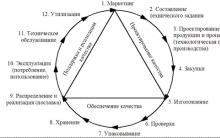Funky Business" (funky business) - a new concept of business management and enterprise creation, outlined in the business bestseller of the same name chiella Nordstrom and Jonas Ridderstrale.
The main features of the funky business Nordström and Ridderstrale are convinced themselves and convince others that the world has changed irreversibly, knowledge is outdated, and business, if it wants to be successful, must change with the world.
The authors tell us that in an era of surplus and global competition, overcapacity in most industries, and consumers who have more leverage over the manufacturer, everything needs to change. The new economy needs new business- innovative, unpredictable, fantastic. We need a funky business.
The main characteristics of the modern world that determine the requirements for business - Dictatorship of knowledge. The main means of production in the modern world, according to Nordström and Riddersthal, is a modest gray matter weighing approximately 1.3 kg - the human brain. Knowledge is the new battleground for entire countries, corporations and individuals. What was in demand before required a little knowledge and a huge amount of bolts and nuts. New products that are valued by consumers today require a huge amount of intellectual input and very little hardware. The success of a business, therefore, depends on the ability to direct the work of minds in the right direction. Leaders must be inundated with knowledge and inundate everyone else with it.
Global competition. The economic reality of our time is that everyone is competing with everyone. As the authors of Funky Business state, we are all participants in global competition. We are moving towards what scientists call techno-economic parity. This means they win best men and women, and no matter where they come from (what country, religion, race, etc.).
Speed. All modern companies compete on the basis of knowledge, but knowledge is short-lived. According to Nordström and Ridderstrale, knowledge should be treated like milk - it should have a release date on it. If you do not use them in time, they will turn sour and become useless. There are no speed limits in the new economy. Agility rules. Speed is everything.
Customization. In a fragmented world, niches are getting smaller. The increasing role of individual orders, coupled with the development of technology and changes in the value system, means that micro-markets are beginning to dominate mass markets. Individualization becomes necessary in all aspects of product development, production and sale. According to the authors of Funky Business, we can soon move from mass production to flexible production, and then to mass customization (adaptation of a mass product to a specific consumer).
What should be the organization to be successful in today's world?
Focus on people. “People decide everything,” Nordström and Ridderstrale say. People make an organization, products and services unique. The most important resource for production, according to the authors of Funky Business, walks around the office in boots and leaves every day. workplace at 5:00. As a result, it is leadership and the ability to manage people that become the key to competitive advantage. Only those companies thrive that have been able to become a good home for talent, since talent today is the only thing that “makes capital dance”. This thesis is related to funky business with the concept of war for talent, proposed in the early 1990s by McKinsey consultants. Like the authors of the war for talent, Nordstrom and Ridderstrale believe that the organization must adapt to people with their characteristics, creating conditions for them to realize their talents.
Innovation. In today's world, a company has no chance of success if it does not pay attention to innovation - in the administrative field, in marketing, in finance, design, leadership. personnel and in the field of services. A business should strive to create a bubbling mixture in which ideas would boil and, as a result, be tolerant of mistakes, because without mistakes there is no progress. It is the mistakes, according to the authors of Funky Business, that, in a sense, underlie the market economy.
Manifold. Nordström and Ridderstrale argue that diversity rules the world. You shouldn't expect any innovation in companies where 90% of all employees are the same sex, about the same age, with the same education, dress the same and everyone plays golf.
Intelligence has a normal distribution. This is not the prerogative of 45-year-old white men. To be successful, a company must give people the freedom to look and think the way they want, and to find a differentiated approach to everyone.
Uniqueness. From a funky business perspective, normality is a road to nowhere. To be successful, a company today must stop being “normal.” You need to take risks, break the rules and regulations, learn to ignore customers. This is the only way to find a truly breakthrough idea and create a unique product that will blow up the market and bring the company millions.
funky firm features
- Less people. As soon as a situation arises when people in the same building stop recognizing each other by sight, the personal factor disappears, and this is the very moment when it's time to break up the company.
- Less levels. The funky firm has less levels in organizational structure. This means that the time between the occurrence of a problem and its resolution is reduced.
- Temporary (project) organization of work. Funky Inc. - a short-term company. This means that most of the work is done in groups and on a project basis.
- Horizontal. When it comes to processes, everything in a funky firm moves horizontally. Vertical hierarchical logic relies on the simple assumption that the smart sit at the top and the stupid sit at the bottom. Hierarchy divides people into those who think and those who do. In reality, however, most of the ideas and problems in the company arise exactly horizontally - between departments, directions, divisions, countries. Moreover, the vertical logic leaves no room at all for suppliers and consumers, they remain outside the boundaries of the firm. A vertical hierarchy is an organization that is "turned to the boss and the ass to the customer." Pyramids should be replaced with playgrounds.
- Circular. Circularity is organizational democracy. In organizations where knowledge and intelligence play a key role, the choice of the head should take into account the voice of each employee, as, for example, the entire professorship chooses the dean in universities. This also applies to joint ownership of a company.
- Open. Not all resources need to be within the firm. In the future, the correct unit of analysis will not be individual firms, but relationships and chains of firms. The funky firm is open to cooperation with consumers, suppliers and competitors.
A business cheat sheet based on the book Funky Business was prepared by Alexander Zykov
In the era of the overwhelming advantage of electronic encyclopedias over traditional, paper ones, it will not be difficult and will not take much time to find out that the word "funk" in relation to music means a dance musical movement characterized by expressiveness, a combination of many different instruments, loud, almost screaming, vocals . In general, such a musical and choreographic way to relax and give free rein to your own emotions. Such a picture somehow does not fit well with the concept of "business", which traditionally has a serious, partly even boring connotation.
That is why a phenomenon called the funky business, which gained popularity during the 2000s, is of particular interest.
Funky business: where did it come from
Until 2000, no one had heard of the funky business, simply because such a thing did not exist. Rather, it existed, but only in the bald heads of Kjell Nordström and two professors at the Center for Advanced Study of Leadership at the Stockholm School of Economics. It was from 2000 that these two scientists began to publish books one after another, which formulated the concept of “funky business” and laid the theoretical basis for this concept, so to speak: “Funky business forever. Capitalism for fun”, “Funky business. Capital dances to the tune of talent,” and so on. These books quickly became so popular that they were translated into 25 languages of the world.
In fact, the funky business philosophy rests on two main pillars, the first of which concerns management, the second - the characteristics of consumption. With regard to consumption patterns, Nordström and Ridderstrale point out that in modern conditions the pleasure of buying is no less, and often even more significant factor than the necessity, expediency, usefulness and even profitability of the purchase. Scientists from Stockholm rightly point out the peculiarities of women's shopping, in which the purchases themselves are not important, as well as their cost and practicality, the most important thing is the process and the feeling of satisfaction from the process itself. In this regard, it is proposed to extend such principles to any type of business that needs to be built in such a way that a product or service evokes, first of all, an emotional desire to spend money, a desire to buy pleasure. With regard to the features of funky control, here the guru new economy(as the authors are called by some followers) emphasize that modern-day leaders, if they want to be successful, can no longer be in the format of a boss sitting far, far away in a luxurious office. New leader must be a leader who possesses such qualities as attractiveness as a model for subordinates, tolerance for his employees, attention to all the details of the business and a clear awareness of the direction of the whole business.
Fundamentals of funky business
Thanks to practical application These fundamental foundations of funky business theory have already sprouted the basic principles of funky business. In different groups of followers of Kjell Nordstrom and Jonas Ridderstrale, a different number of these principles are distinguished, some are divided into several more detailed and substantive ones, others, on the contrary, are combined into more general constructions. If we consider the most commonly used principles of this business theory in practice, we get the following list:
- first of all, the uniqueness of the goods and services offered in the modern market, filled with the same goods, differing from each other only by logos and brands. Uniqueness, originality is the main way to attract the attention of the buyer and client (even if this originality is only external, marketing);
- constant search for ideas for business development, new marketing solutions, ideas for technological development, for the discovery of new production and creative developments;
- use of the most modern technologies not in theory, but in practice: in the current conditions, access to information should come first, because the principle “who owns the information, owns the world” is becoming more relevant every day;
- the priority of leaders-leaders over the leaders of the old formation, the leaders-bosses;
- speed, speed and once again speed: from the moment a decision is made to its implementation, a minimum time should pass - today the advantage is not with those who come up with this or that idea earlier, but with those who implement it faster;
- no need to be afraid to make connections because of fear of competition - the benefit from a large number of those who know about a particular business and its products or services is much higher than the risk of suffering from competitors;
- the client must feel that he is loved, not just respected or expected, but simply loved as a family member - in the conditions of equality of other indicators, a person will always choose the place where he is emotionally more comfortable;
- in addition, it is the client, his needs, tastes, peculiarities of perception that should be taken into account and be at the forefront at every stage of the business process; in other words, the client must be part of the company, if you can do it directly (arrange surveys among clients, involve them in discussions), this is the best option;
- it is necessary to emphasize when developing a product or service that the product or service must be of an individual nature so that the client can discover special features that are not found in another product of the same purpose, but bought by another person.
Alexander Babitsky
Kjell A. Nordström, Jonas Ridderstrale
Funky business. Capital dances to the tune of talent
TALENT MAKES CAPITAL DANCE
J. Ridderstrale
Translation from English - Pavel Pavlovsky
Design - Katharina Lapidot
Cover photo - Thomas Engstrom
Edited by Vasily Dermanov
Legal support of the publishing house is provided by the law firm "Vegas-Lex"
© Kjell Nordström, Jonas Ridderstrale, 2007
© BookHouse Publishing AB, 2000
© Translation into Russian, edition in Russian, design. LLC "Mann, Ivanov and Ferber", 2013
Kjell Nordström and Jonas Ridderstrale
Kjell Nordström and Jonas Ridderstrale are included in the Thinkers 50 (thinkers50.com) global business thinkers ranking ninth in the world and first in Europe.
Both authors hold Ph.D. degrees from the Stockholm School of Economics. They are at the forefront of a new generation of European business gurus. Their approach is truly global, and their fresh perspective on today's business life makes them one of the world's most respected and successful speakers and lecturers.
Introduction
Management for people
Things have become individual. Freedom is a new all-pervading virus. There are more and more of us who throw off the mental shackles. Everyone has a choice. Europe, Asia and the Americas have abandoned the old way of life. Traditional institutions no longer take responsibility for our destiny. Those responsible for our well-being are destroyed, because of their neglect or for political reasons. The decline of these institutions is a fact of life, and even raising taxes cannot restore order.
Greater freedom equals greater responsibility. If you don't make a choice, someone else somewhere else will make it for you. And you can be sure: this someone will not particularly care about your well-being.
We are lonely
The new Welfare Society (and at this stage it really looks more like a society than a state) is designed by Ikea. The constituent parts of this society are like a set of blocks children's constructor, which you can assemble yourself, and as you may have noticed, assembly instructions are not included.
To survive and thrive, you must equip yourself with the most deadly of weapons: knowledge.
"Funky Business" - a story about the loneliness of an aloof thinker
Funky Business is a self-help book, but a very different one. Instead of telling people what to think about, we invite them to think about the matters that are now reshaping our societies, businesses, companies, professional activity and of course our privacy. Rather than collect a single crop from one field, we went in search of models that are acceptable for different fields of knowledge and different levels analysis. We hope that this guide to our time will help someone make more right choice or at least understand that not choosing is also a kind of choice. You simply cannot avoid the choice. So choose wisely.
Some readers of Funky Business were surprised that the book was written by two Swedish professors. And that's why some people didn't read our book! However, there are many reasons why it was written by the Swedes. Sweden in general and Stockholm in particular is the most modern place on the planet. Sweden may have gone much further than other parts of the Western world in understanding what it means to be and feel, understand and experience its modernity. The underlying idea that has driven Sweden over the past few decades is the intention to break the tenets of the past: to deregulate life by giving people the freedom to know, move and do what they want, regardless of gender, class, etc.
All this led to the strengthening of the role of education and individual freedom, but also to the loss of stability; young Swedes have to survive and thrive in an environment of extreme uncertainty. Fortunately or unfortunately, we are not at all familiar with the idea of eternal devotion to a country, company, husband or wife, because we have never experienced it. Sweden prepared for our times of uncertainty even when there was no idea that they were destined to be uncertain.
Funk: Feedback
Funky Business has been translated into over 25 languages - three times as many languages as copies of our dissertations have been sold.
Reaction to the book has been overwhelmingly positive, but each place is different. In the Nordic countries and in the United States, people wanted to know how to create a company in troubled times that would prosper, and what are the characteristics of successful leaders. Further south, and in newly industrialized countries, questions focused on social level: the future of democracy, government, etc.
Some in Scandinavia found the book "neoliberal" (apparently a derogatory epithet); at the same time, commentators in the States took note of our assertion that the author of the communist manifesto, Karl Marx, was right. Some even refused to appear at the book launch in New York because they didn't want to be associated with the communists. We would like to thank them for taking advantage of their freedom of choice. Another source of controversy is that we have placed the individual at the center. Representatives of Anglo-Saxon cultures perceive this position with approval, the rest - with doubt. What happens to a society when individuals rule it?
How to work "funky": new reality dictates new rules
Two Swedish professors at the end of the last century noticed and described the underlying trends that still have a strong influence on the market. They relate to changes in the psychology of people and the structure of society, the spread of new technologies and objective macroeconomic shifts. The new reality dictates new rules. To work in a new way, or "funky" means to radically change the way of thinking and build your business not so that it constantly grows and lasts as long as possible, but in such a way as to explode reality right now.
It is no coincidence that the book was written by the Swedes. This country has long been living according to the described principles. Its development over several decades was determined by a big idea - the destruction of the commandments of the old life and the provision of freedom for everyone to follow their own path, regardless of gender, social class and other familiar attributes. As a result, everyone has more personal freedom, but at the same time the general degree of instability has increased. Young Swedes made their way in conditions of extreme uncertainty, therefore, before all of us, they were ready for modern life, in which there is no place for lifelong loyalty - neither to the country, nor to the company, nor to the partner.
The book, with the memorable title Funky Business, has been rewritten and reprinted several times since 2000 and has been translated into 30 languages. (The authors admit that the title has become almost more popular than the book itself: many have accepted this slogan without even reading the text.) , doing business.
Introduction
If the world is a theater in which we play roles, then today our theater is preparing for an unusual premiere. The director is gone, the script is lost, the audience is climbing onto the stage to participate in the performance. There are no more good and bad heroes, all boundaries are blurred. The usual rules do not apply, we participate in constant improvisation. Who wants stability, let him stay at home.
Only those who are not afraid of the confusion of concepts in all spheres of life can work in the market today: East - West, structure - process, right - wrong, and even a man - a woman. Blurring occurs at all levels: state, society, organization, individual. You either accept change or you run away from it.
What happened to the world: 7 changes that must be accepted
1. Confusion and blurring of boundaries at all levels. It is very difficult to come up with something fundamentally new - it seems that everything has already been invented before us. The only way to achieve an original result is to combine known components. Take a look at edu-tainment and info-tainment (education and information with entertainment), corporate universities, ready-made business lunches with delivery, smartphones, email and electronic media, biotechnology, antibacterial clothing, etc. Canon uses achievements in chemistry, electronics and new programming opportunities in its developments. And who will distinguish a bank from an insurance company? Basically, they offer the same services. Any new niche today is represented by some kind of hybrid.
There are almost no goods left on the market. For example, in 2003 more than half of IBM's revenue came from services, and in 2004 the company sold its "physical" computer business altogether. Many products are being converted into bundled offers. Remember financial conditions accompanying the purchase of durable goods or package offers financial institutions. Even simple products are increasingly reminiscent of services. For example, is Happy Meal at McDonald's a product or a service? Both.
Mixing is not only taking place in the marketplace, geographic and moral barriers are also eroded. In society, the distance between different social roles is shrinking: for example, students do not feel in awe of teachers, buyers are aware of goods better sellers and patients know more about their diagnoses than doctors. The population of a typical European country is 15-25% foreigners. People of different mentalities and religions live side by side. At the state level, there are no more values shared by all, no one can unequivocally answer the questions: what is more valuable - wealth or knowledge; stability or change, individualism or collectivism.
Multinational companies have stopped thinking about the boundaries of nation states - for them, the boundaries lie not between countries, but between consumer markets. Why do you need separate divisions in Finland, Norway and Sweden? Most likely, you need a single Scandinavian office. Why separate branches in Germany and Austria? One is enough, which would work with the German-speaking countries of Europe. Nowadays, it is not the citizenship of the client that matters, but completely different indicators - language, culture, age, climate, gender, lifestyle.
KJELL NORDSTREM,
JONAS RIDDERSTRALE
"BUSINESS IN FUNK STYLE"
The book is downloaded for personal acquaintance from the site: http://best-resume.net/free.htm
Stockholm School of Economics. Business Week magazine ranked them among the top five in
directions economic development and what it means for countries, corporations and
individual people.
"Funky Business" convincingly demonstrates: the world has changed, knowledge is outdated,
only those who are different can succeed. Being different means
focus on what people think, not what organizations do.
Therefore, there is no more "business as usual", we must turn it into a "business in
funky style.
The book has been translated into more than 25 languages and is published in 25 countries.
Kjell Nordstrom, Jonas Ridderstrale, Sweden
Series "Books of the Stockholm School of Economics in St. Petersburg".
Translation Copyright©Stockholm School of Economics in St. Petersburg, 2002, third edition,
revised and expanded (with permission from BookHouse Publishing, Stockholm, Sweden)
ISBN 5-315-00010-9 Printed in Finland.
The book is intended for personal information only. All rights to this book
belong to their owners. The text of the book is taken from open sources.
Commercial use of this copy is prohibited.
The book is downloaded for personal acquaintance from the site: http://best-resume.net/free.htm
Funk era
We won: the era of the triumph of capitalism has come! We conquered the world from Beijing to
Baltimore, from St. Petersburg to Singapore. Western political leaders are having a hard time
hold back satisfied smiles as they inspect new stock exchanges in countries
which until recently were the outposts of the communist empire. Western eyes
businessmen are full of undisguised pride when they happen to meet
Chinese entrepreneurs who made fortunes overnight. Since
the fall of the Berlin Wall, the spirit of triumph is in the air. Capitalism uber alles.
But there is one small problem. Karl Marx was right. We all need to buy now
a ticket on the first plane to Heathrow, catch a taxi and go to Highgate Cemetery.
There, in an ivy-covered grave, lie the decaying remains of the author of the Manifesto
The Communist Party, the great theoretician of communism - Karl Marx. Not
interrupted the flow of visitors to the last refuge of the great man. And
many people around the world yearn to see the decaying remains of his disciples.
We, too, must pay tribute to them.
We must pay tribute to Ho Chi Minh. He is now in a crystal coffin in Hanoi,
in greenhouse conditions with controlled humidity of 60% and a temperature of 22 ° C, but he
sleep peacefully, for he was right. This also applies to Vladimir Ilyich Lenin. Every 18
months he takes a bath with a solution of alcohol, glycerin and potassium acetate (acetate
potassium), and after two weeks his skin becomes soft and tender, like a bottom
two month old baby.
75 years after the death of the leader, his mausoleum is nothing more than just a tourist
attraction for the "capitalist comrades" of the West. And yet, despite
to such a humiliating position as a leader and our irony, we must admit that Lenin
was right. Chairman Mao Zedong was also right. Today Mao goes under the hammer with everything
the scope of a market economy - for only 50,000 Hong Kong dollars you can buy
24 carat gold statue of the Great Pilot by Sing Kwong Jewelry & Gold Co. You
you can buy a service that belonged to Eric Honecker, or souvenirs from
depiction of Enver Hoxha. They were all dirty communist dictators
but they were right.
They were right because they shared the views of Karl Marx and believed that everything
the wealth of society belongs to the people and that the workers should own the means
production. Today we own them. We've probably always owned them, we just don't
understood this.
Workers own the main means of production. Revolution, or rather, its first
part completed. workers
Programmers, developers of new software
supplies in Frankfurt, shipbuilders in the shipyards in Stavanger, creatives in
Angeles, option sellers in Singapore use their brains all the time and only
sometimes their muscular strength to create new goods. In modern companies
70 to 80% of everything that is done by people is done with the help of their intellect. Main
the means of production is a modest gray matter weighing approximately 1.3 kg. This is
human brain.
The book is intended for personal information only. All rights to this book
belong to their owners. The text of the book is taken from open sources.
Commercial use of this copy is prohibited.
The book is downloaded for personal acquaintance from the site: http://best-resume.net/free.htm
The main means of production is a modest gray matter weighing approximately 1.3
kg. This is the human brain.
The human brain is notoriously complex and poorly understood. We know, however, that he
organized according to the holographic principle
Each part repeats the whole.
Laboratory studies have shown that if nine-tenths of the brain is removed
man, he will still continue to work. And try to do the same
most with your car or VCR!
Our brain is capable of defeating the most advanced computer on earth. Worth remembering
about Gary Kasparov playing with the IBM Deep Blue computer in February 1996. Is it a machine
did not win then the person? Won, but her victory was possible only because
both players acted according to well-defined rules and used
limited number of strategies. The problem of corporate chess players is that
that future competitiveness is not determined by current rules. She is
determined by the ability to break and change these rules. Success will depend on
the ability of managers to challenge the common truths of today,
the ability to move a pawn from A2 to E7 in one single move.
And John F. Kennedy was also right when he said that "the most extraordinary
a computer on earth is a person. "He was right both then and now, when the entire cumulative
computer memory is superior to human memory. People can be creative
they can come up with new ideas, change the rules, they can be emotional.
Computers can't. Till!
The human brain is recognized as an amazing, incomprehensible mechanism. But remains
simple question: who owns it? Neither shareholders, nor creditors, nor any other
organizations cannot own the human brain. George Soros may
destabilize the state currency or the securities market of an entire country, but
it has no control over your brain. The government can send you flying on
full speed propaganda machine, but your head will remain with you. your brain,
good or bad, belongs only to you.











Layout of the house, plans of houses and cottages
Small Business - Home Production Ideas
History of JANOME. Sewing machines. Janome, Veritas, Pfaff Sewing machine janome manufacturer country
Working with the tattis system
Properties of copper and its application